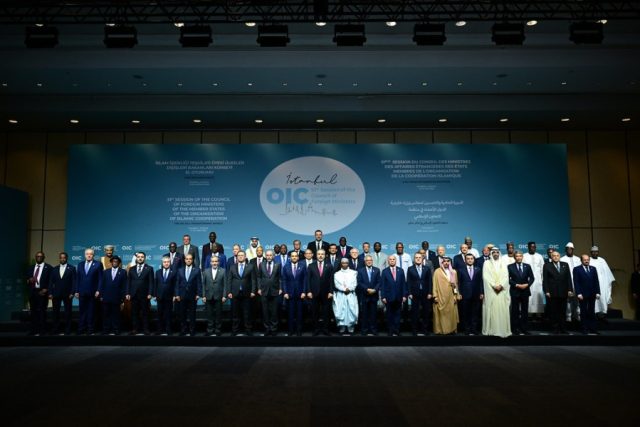ISTANBUL, Monday, June 23, 2025 (WNP): The Council of Foreign Ministers (CFM) of the Organisation of Islamic Cooperation (OIC), in a strong show of unity during its 51st session, condemned Israel’s recent aggression against Iran and called for an immediate halt to the attacks.
The ministers also emphasized the importance of maintaining the ceasefire agreement between Pakistan and India, urged strict adherence to the Indus Waters Treaty, and called for comprehensive bilateral dialogue to resolve outstanding disputes.
Held under the theme “The OIC in a Transforming World,” the two-day session culminated in the adoption of the Istanbul Declaration. The declaration condemned Israel’s destabilizing actions in the region, including military strikes on Iran, Syria, and Lebanon, which were labeled as flagrant violations of the sovereignty and security of those nations and of international law.
The council resolved to hold Israel accountable and announced the formation of an open-ended Ministerial Contact Group to engage relevant regional and global actors in efforts to de-escalate the crisis and achieve a peaceful resolution.
The foreign ministers expressed deep concern over the dangerous escalation posed by Israeli attacks on Iran, warning of its profound implications for human, economic, and environmental stability across the region. They also voiced strong solidarity with the government and people of Pakistan, condemning the recent unjustified strikes on various locations in Pakistan and Azad Jammu and Kashmir, and called for maximum restraint to prevent further regional destabilization.
The ministers urged respect for all bilateral agreements, particularly the Indus Waters Treaty, and underscored the need for sustained dialogue between Pakistan and India to peacefully resolve all outstanding issues. Reaffirming their commitment to the people of Jammu and Kashmir, the OIC ministers expressed full support for their right to self-determination in line with UN and OIC resolutions and condemned the grave human rights violations in Indian Illegally Occupied Jammu and Kashmir.
The Palestinian cause was once again highlighted as a central priority for the OIC. The ministers reiterated firm support for the establishment of an independent, sovereign, and contiguous Palestinian state based on the 1967 borders, with East Jerusalem as its capital. They backed the convening of a United Nations high-level conference on the peaceful settlement of the Palestine issue and implementation of the two-state solution, co-chaired by Saudi Arabia and France, urging active participation by all UN member states.
Condemning the 19-month-long Israeli campaign of violence in Gaza and the West Bank, the council accused Israel of committing genocide and using starvation as a weapon by obstructing humanitarian access. They called for an immediate, durable ceasefire and the full implementation of UN Security Council Resolution 2735.
The ministers also rejected any attempts to forcibly displace Palestinians, stressed the urgent need for the opening of border crossings, and demanded unhindered delivery of aid and protection for Palestinian civilians.
The CFM reaffirmed support for UNRWA and condemned any plans aimed at displacing Palestinians or systematically targeting Gaza’s essential infrastructure. Expressing concern over Israeli attempts to alter the character of Al-Quds Al-Sharif, the council stressed the importance of preserving the city’s Arab and Islamic identity and maintaining its legal status as a symbol of tolerance and coexistence among the Abrahamic faiths.
Raising alarm over the rising tide of Islamophobia, the foreign ministers urged the international community to take effective action against extremism, hate speech, religious defamation, and racial or religious stereotyping. They affirmed that terrorism and extremism are not tied to any religion or ethnicity and must be unequivocally condemned in all forms.
The council welcomed the normalization process between Azerbaijan and Armenia, including progress on a peace agreement, and urged Armenia to resolve remaining obstacles to its formal signing. Support was also expressed for the Syrian Interim Government’s reintegration into regional and international systems, with an emphasis on maintaining political and financial support to stabilize the country.
The ministers backed the rights of the Muslim Turkish Cypriots, as well as the Turkish Muslim minorities in Western Thrace and the Dodecanese Islands of Greece, to fully enjoy their civil and religious freedoms. They also condemned ongoing human rights violations against the Rohingya and other Muslim communities in Myanmar and criticized the Republika Srpska’s actions that threaten the sovereignty of Bosnia and Herzegovina and the Dayton Peace Agreement.
The 51st OIC CFM session concluded with a strong reaffirmation of Muslim unity, collective responsibility, and diplomatic engagement to address the pressing challenges facing the Islamic world.




